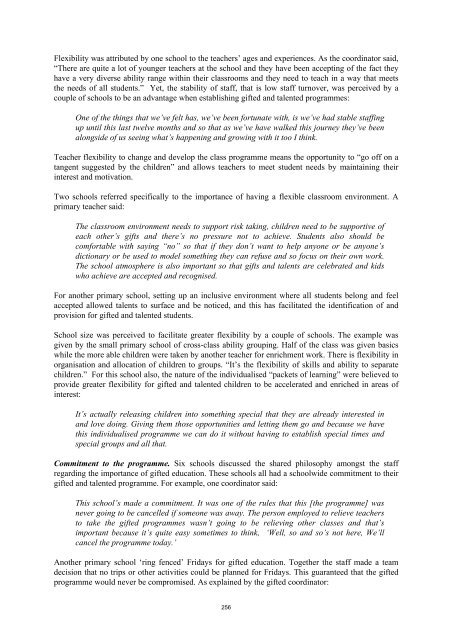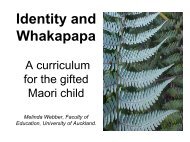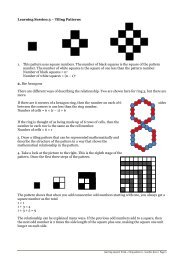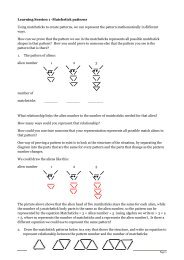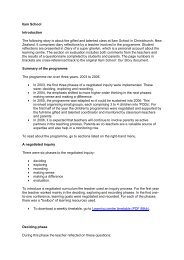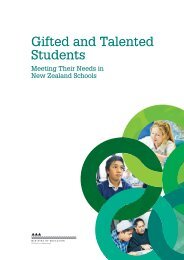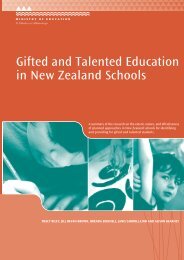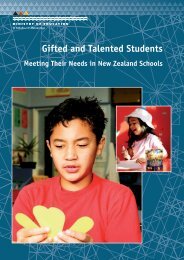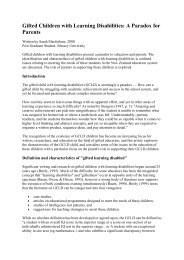The Extent, Nature and Effectiveness of Planned Approaches in ...
The Extent, Nature and Effectiveness of Planned Approaches in ...
The Extent, Nature and Effectiveness of Planned Approaches in ...
Create successful ePaper yourself
Turn your PDF publications into a flip-book with our unique Google optimized e-Paper software.
Flexibility was attributed by one school to the teachers’ ages <strong>and</strong> experiences. As the coord<strong>in</strong>ator said,“<strong>The</strong>re are quite a lot <strong>of</strong> younger teachers at the school <strong>and</strong> they have been accept<strong>in</strong>g <strong>of</strong> the fact theyhave a very diverse ability range with<strong>in</strong> their classrooms <strong>and</strong> they need to teach <strong>in</strong> a way that meetsthe needs <strong>of</strong> all students.” Yet, the stability <strong>of</strong> staff, that is low staff turnover, was perceived by acouple <strong>of</strong> schools to be an advantage when establish<strong>in</strong>g gifted <strong>and</strong> talented programmes:One <strong>of</strong> the th<strong>in</strong>gs that we’ve felt has, we’ve been fortunate with, is we’ve had stable staff<strong>in</strong>gup until this last twelve months <strong>and</strong> so that as we’ve have walked this journey they’ve beenalongside <strong>of</strong> us see<strong>in</strong>g what’s happen<strong>in</strong>g <strong>and</strong> grow<strong>in</strong>g with it too I th<strong>in</strong>k.Teacher flexibility to change <strong>and</strong> develop the class programme means the opportunity to “go <strong>of</strong>f on atangent suggested by the children” <strong>and</strong> allows teachers to meet student needs by ma<strong>in</strong>ta<strong>in</strong><strong>in</strong>g their<strong>in</strong>terest <strong>and</strong> motivation.Two schools referred specifically to the importance <strong>of</strong> hav<strong>in</strong>g a flexible classroom environment. Aprimary teacher said:<strong>The</strong> classroom environment needs to support risk tak<strong>in</strong>g, children need to be supportive <strong>of</strong>each other’s gifts <strong>and</strong> there’s no pressure not to achieve. Students also should becomfortable with say<strong>in</strong>g “no” so that if they don’t want to help anyone or be anyone’sdictionary or be used to model someth<strong>in</strong>g they can refuse <strong>and</strong> so focus on their own work.<strong>The</strong> school atmosphere is also important so that gifts <strong>and</strong> talents are celebrated <strong>and</strong> kidswho achieve are accepted <strong>and</strong> recognised.For another primary school, sett<strong>in</strong>g up an <strong>in</strong>clusive environment where all students belong <strong>and</strong> feelaccepted allowed talents to surface <strong>and</strong> be noticed, <strong>and</strong> this has facilitated the identification <strong>of</strong> <strong>and</strong>provision for gifted <strong>and</strong> talented students.School size was perceived to facilitate greater flexibility by a couple <strong>of</strong> schools. <strong>The</strong> example wasgiven by the small primary school <strong>of</strong> cross-class ability group<strong>in</strong>g. Half <strong>of</strong> the class was given basicswhile the more able children were taken by another teacher for enrichment work. <strong>The</strong>re is flexibility <strong>in</strong>organisation <strong>and</strong> allocation <strong>of</strong> children to groups. “It’s the flexibility <strong>of</strong> skills <strong>and</strong> ability to separatechildren.” For this school also, the nature <strong>of</strong> the <strong>in</strong>dividualised “packets <strong>of</strong> learn<strong>in</strong>g” were believed toprovide greater flexibility for gifted <strong>and</strong> talented children to be accelerated <strong>and</strong> enriched <strong>in</strong> areas <strong>of</strong><strong>in</strong>terest:It’s actually releas<strong>in</strong>g children <strong>in</strong>to someth<strong>in</strong>g special that they are already <strong>in</strong>terested <strong>in</strong><strong>and</strong> love do<strong>in</strong>g. Giv<strong>in</strong>g them those opportunities <strong>and</strong> lett<strong>in</strong>g them go <strong>and</strong> because we havethis <strong>in</strong>dividualised programme we can do it without hav<strong>in</strong>g to establish special times <strong>and</strong>special groups <strong>and</strong> all that.Commitment to the programme. Six schools discussed the shared philosophy amongst the staffregard<strong>in</strong>g the importance <strong>of</strong> gifted education. <strong>The</strong>se schools all had a schoolwide commitment to theirgifted <strong>and</strong> talented programme. For example, one coord<strong>in</strong>ator said:This school’s made a commitment. It was one <strong>of</strong> the rules that this [the programme] wasnever go<strong>in</strong>g to be cancelled if someone was away. <strong>The</strong> person employed to relieve teachersto take the gifted programmes wasn’t go<strong>in</strong>g to be reliev<strong>in</strong>g other classes <strong>and</strong> that’simportant because it’s quite easy sometimes to th<strong>in</strong>k, ‘Well, so <strong>and</strong> so’s not here, We’llcancel the programme today.’Another primary school ‘r<strong>in</strong>g fenced’ Fridays for gifted education. Together the staff made a teamdecision that no trips or other activities could be planned for Fridays. This guaranteed that the giftedprogramme would never be compromised. As expla<strong>in</strong>ed by the gifted coord<strong>in</strong>ator:256


